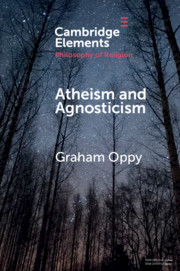Bibliography
Allen, W. (1964) Woody Allen Colpix CP 518 (track eight: ‘NYU’).
Antony, L. (ed.) (2007) Philosophers without Gods. Oxford: Oxford University Press.
Atran, S. (2002) In Gods We Trust. New York: Oxford University Press.
Ayer, A. (1936) Logic, Truth and Language. London: Victor Gollancz Ltd.
Berman, D. (1988) A History of Atheism in Britain. Abingdon: Routledge.
Blom, P. (2010) A Wicked Company: The Forgotten Radicalism of the European Enlightenment. New York: Basic Books.
Bonett, W. (ed.) (2010) The Australian Book of Atheism. Melbourne: Scribe.
Budd, S. (1977) Varieties of Unbelief: Atheists and Agnostics in English Society 1850–1960. Portsmouth: Heinemann.
Bullivant, S. (2013) ‘Defining “Atheism”’ in Bullivant, and Ruse, , 11–21.
Bullivant, S. and Ruse, M. (eds.) (2013) Handbook of Atheism. Oxford: Oxford University Press.
Chalmers, D. (1996) The Conscious Mind. Oxford: Oxford University Press.
Colbert, S. (2007) I am America (and So Can You!). New York: Grand Central Publishing.
Curran, M. (2012) Atheism, Religion and Enlightenment in Pre-Revolutionary Europe. London: Boydell & Brewer.
Dawes, G. (2009) Theism and Explanation. New York: Routledge.
D’Holbach, P. (1790/1820) The System of Nature, translated by Wilkinson, S.. London: Thomas Davison.
Doyle, A. (1922/2006) The Coming of the Fairies. Lincoln: University of Nebraska Press.
Earman, J. (1996) Bayes or Bust? Cambridge: MIT Press.
Earman, J. (2000) Hume’s Abject Failure. Oxford: Oxford University Press.
Edgell, P., Gerteis, J., and Hartmann, D. (2006) ‘Atheists as “Other”: Moral Boundaries and Cultural Membership in American Society’ American Sociological Review 71, 211–34.
Everitt, N. (2004) The Non-Existence of God. London: Routledge.
Flynn, T. (ed.) (2007) The New Encyclopedia of Unbelief. Amherst: Prometheus.
Forbes, G. (1994) Modern Logic. Oxford: Oxford University Press.
Gervais, W. and Najile, M. (2017) ‘How Many Atheists are There?’ Social Psychological and Personality Science, DOI: 10.1177/1948550617707015.
Gervais, W., Norenzayan, A., and Shariff, A. (2011) ‘Do you Believe in Atheists? Distrust is Central to Anti-Atheist Prejudice’ Journal of Personality and Social Psychology 101: 1189–206.
Goldschmidt, T. (ed.) (2013) The Puzzle of Existence. London: Routledge.
Griffiths, F. and Lynch, C. (2009) Reflections on the Cottingley Fairies. Black Hawk: JMJ Publications.
Guthrie, S. (1993) Faces in the Clouds. New York: Oxford University Press.
Hájek, A. (2008) ‘Are Miracles Chimerical?’ Oxford Studies in Philosophy of Religion 1: 82–104.
Haldeman-Julius, E. (1931) The Meaning of Atheism. Girard: Haldeman-Julius Publications.
Horwich, P. (1982) Probability and Evidence. Cambridge: Cambridge University Press.
Hunter, M. and Wootton, D. (eds.) (1992) Atheism from the Reformation to the Enlightenment. Oxford: Clarendon.
Huxley, T. (1889/1894) ‘Agnosticism and Christianity’ in Collected Essays of Thomas Henry Huxley, Volume 5. Cambridge: Cambridge University Press, 309–65.
Jacoby, S. (2013) The Great Agnostic: Robert Ingersoll and American Free Thought. New Haven: Yale University Press.
James, W. (1902) Varieties of Religious Experience. London: Longmans.
Jillette, P. (2011) God, No!: Signs You May Already be an Atheist and Other Magical Tales New York: Simon & Schuster.
Le Poidevin, R. (1996) Arguing for Atheism. London: Routledge.
Le Poidevin, R. (2010) Agnosticism. Oxford: Oxford University Press.
Leslie, J. (1989) Universes. London: Routledge.
Losure, M. (2012) The Fairy Ring; or Elise and Frances Fool the World. Somerville: Candlewick Press.
Manson, N. (ed.) (2003) God and Design. London: Routledge.
Mackie, J. (1982) The Miracle of Theism. Oxford: Clarendon.
Martin, M. (1990) Atheism: A Philosophical Justification. Philadelphia: Temple University Press.
Martin, M. (ed.) (2007) Companion to Atheism. Cambridge: Cambridge University Press.
Millican, P. (2013) ‘Twenty Questions about Hume’s “Of Miracles”’ in O’Hear, A. (ed.) Philosophy and Religion. Cambridge: Cambridge University Press, 151–92.
Oppy, G. (2013) The Best Argument against God. London: Palgrave Macmillan.
Oppy, G. (ed.) (2018) A Companion to Atheism and Philosophy. Chichester: Wiley-Blackwell.
Paul, G. (2005) ‘Cross-National Correlations of Quantifiable Societal Health with Popular Religiosity and Secularism in Prosperous Democracies’ Journal of Religion and Society 7: 1–17.
Platinga, A. (2012) Where the Conflict Really Lies Oxford: Oxford University Press
Priest, G. (2000) Logic: A Very Short Introduction. Oxford: Oxford University Press.
Reppert, V. (2009) ‘The Argument from Reason in Craig, W. and Moreland, J. (eds.) Companion to Natural Theology Maldon: Wiley-Blackwell
Rowe, W. (1976) ‘The Ontological Argument and Begging the Question’ International Journal for Philosophy of Religion 7: 443–7.
Sartre, J. (1964) The Words, translated by Frechtman, B.. New York: George Braziller.
Schellenberg, J. (2007) The Wisdom to Doubt: A Justification of Religious Scepticism. Ithaca: Cornell University Press.
Smith, T. (2017) Science and Religion: A Conflict of Methods. PhD dissertation, University of Otago.
Sobel, J. (2004) Logic and Theism. Cambridge: Cambridge University Press.
Swinburne, R. (ed.) (2002) Bayes’ Theorem. Oxford: Oxford University Press.
Talmont-Kaminski, K. (2012) In a Mirror Darkly. Lublin: Wydawnictwo Uniwersytetu Marii Curie-Skłodowskiej.
Thrower, J. (2000) Western Atheism: A Short History. Amherst: Prometheus.
Van Inwagen, P. (2018) ‘Begging the Question’ in Oppy, G. (ed.) Ontological Arguments. Cambridge: Cambridge University Press.
Von Hegner, I. (2016) ‘Gods and Dictatorships: A Defence of Heroic Apatheism’ Science, Religion and Culture 3.
Whitmarsh, T. (2015) Battling Gods: Atheism in the Ancient World. New York: Knopf.
Zuckerman, P. (2009) ‘Atheism, Secularity and Well-Being: How the Findings of Social Science Counter Negative Stereotypes and Assumptions’ Sociology Compass 3: 949–71.





